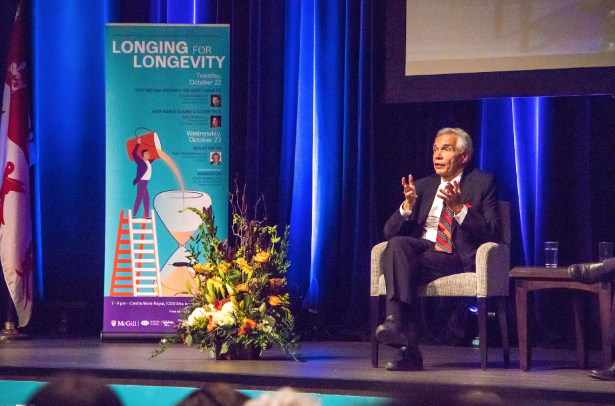The 2019 Trottier Public Science Symposium, hosted by the Office for Science and Society from Oct. 22 – 23, addressed the unavoidable process of aging in a presentation titled “Longing for Longevity.” The second night featured keynote speakers Joe Schwarcz, director of the office, and psychosexual therapist and author Ruth Westheimer.
In his opening remarks, Tomlinson Professor of Chemistry Bruce Lennox shared the symposium’s mandate.
“The Trottier Symposium […] has proven to be a key element in the promotion of science and science communication […] to the public [….] This is the 20th year [for] the office for Science and Society, something that’s really quite a landmark in public science outreach in the world,” Lennox said. “The office, of course, has a national and international presence in its mission […] to separate sense from nonsense on the scientific stage.”
According to Schwarcz, there is a long history of nonsensical claims in scientific research about longevity. From believing that urine is a source of longevity to encouraging the so-called rejuvenating practice of ‘lying with young women,’ there is no shortage of ridiculous methods in history.
“This sort of silly science now has hard roots to it, but it goes beyond that,” Schwarcz said. “Today, researchers are looking at telomeres, […] the end of the chromosomes, […] and every time a cell divides, there is a disturbance of the end of the chromosome, and the belief is that if somehow you could prevent that you could slow down aging [….] In 2009, a nobel prize was awarded for this kind of research [done by] Jack Szostak, […] a McGill graduate.”
In his presentation, Schwarcz acknowledged that the ‘cure for aging’ remains unknown.
“No, we’re not going to cheat death [.…] You don’t get out of life alive, but the idea is to put off death to the very last minute,” Schwarcz said.
Schwarcz also noted the connection between sexuality and mortality by referring to a recent British study that showed sex can slow aging.
Beyond her experience as a sex therapist, Westheimer has lived around the world. She was born in Germany and escaped to Switzerland during the Holocaust, where she continued to live for 10 years.
“If you would have told me, the child of orthodox Jewish parents, that I would talk about orgasms at McGill University, I would have said ‘you must be crazy,’” Westheimer said. “The one thing I knew […] is that I had to do something to [justify] that I am alive while one [and a half] million […] Jewish children were killed.”
Westheimer emphasized the importance of proper and well-rounded sexual education.
“In today’s world, we don’t have the luxury not to be sex educated,” Westheimer said. “We have to do sex education. Girls [and] women menstruate at an earlier and earlier age [….] We do have to tell girls and boys about menstruation [….] We do have to talk about nocturnal emission, [and] about wet dreams.”
Dr. Ruth believes the roots of sexual illiteracy come from psychologist Sigmund Freud’s influence in academia.
“Sigmund Freud should’ve taken a course with me,” Westhiemer said. “He did us women a tremendous disservice, because he said as if sex was only for […] men and that there was nothing in it for women.”
The celebration and de-stigmatization of female sexuality is a central theme in Westheimer’s work. She also advocates for the education of sex beyond traditional methods and the acceptance of diverse types of sexual relationships.
“The whole issue of sexual satisfaction […] doesn’t have to be a penis inside a vagina [….] It doesn’t have to be the way it used to be when they were younger, so people should adjust to that [….] If there is a problem, I’m all for going for a few sessions to a sex therapist.”
Westheimer left a piece of advice to young and old people in the audience alike.
“Make sure that you are sexually literate, that you know what is changing [in the world], and that you do know to go for help if there is a question,” Westheimer said.








